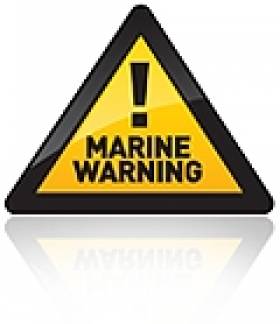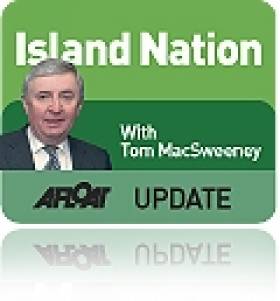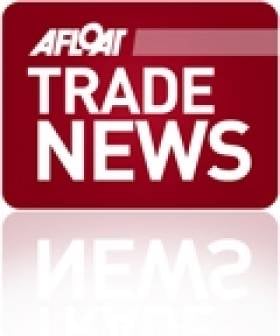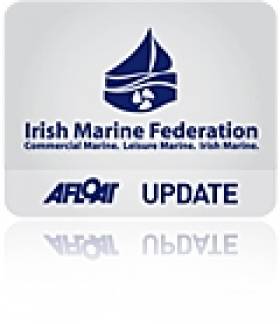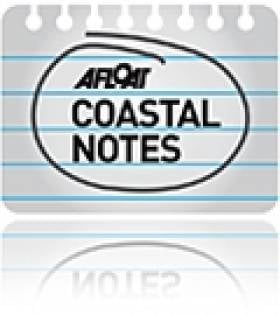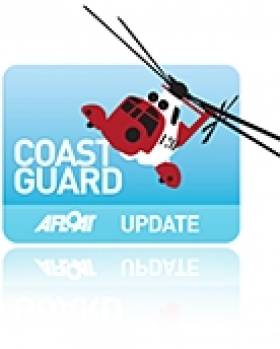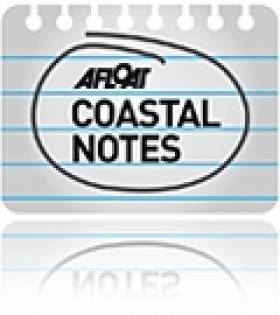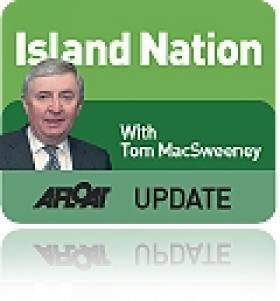Displaying items by tag: Marine
Surveyors Issue Boat Launch Warning
Boat owners are being warned of of the lasting consequences of the winter's big freeze and the possible damage to boats on launching this season.
At the most recent meeting of the Irish Branch of the International Institute for Marine Surveying members highlighted a real danger of some boats sinking shortly after being launched due to cracked pipe work on intakes and discharges where fresh water was not drained from cooling and other systems.
Owners and Boat yard employees are reminded to check carefully all pipe work prior to launching boats and immediately when the boat enters the water. Check that all valves are operating correctly. Complete a full check for leaks and monitor the bilge water during the first few hours when the boat has been re-launched.
Engine blocks should also be checked for frost damage prior to staring them. Do not start them if you see fractures, have the engine checked by a marine mechanic if in any doubt whatsoever. Batteries may also be dead and need of replacement due to the severe weather experienced over the Winter months.
Marine Department Promised, First America's Cup Capsize, Whales and Sailing Oil Tankers
I am reflecting this week on a varied list of maritime issues which have arisen in my writings on marine topics.
Following recent pieces I wrote about the attitude of political parties in the General Election towards the marine sector, I had a telephone call from a senior Fine Gael politician and, lo and behold, the party included the marine sector in its manifesto, pledging to restore the Department of the Marine, abolished by Fianna Fail. I await post-election developments with interest.
It has been a good week for those interested in protection of whales and dolphins. Hundreds of dolphins were spotted off the Old Head of Kinsale, apparently following shoals of herring and sprat on which they were feeding.
In the Antarctic the Japanese whaling fleet was forced to give in to pressure to stop culling. The Japanese have killed hundreds of whales every year, claiming this was for "scientific purposes," even though it has been identified worldwide as for human consumption. The fleet was ordered home by its Government after increasing international pressure.
The Irish Whale and Dolphin Group published its annual report this week. It was formed in December 1990, dedicated to the "conservation and better understanding" of cetaceans - whales, dolphins and porpoise - in Irish waters through "study, education and interpretation." IWDG turnover in 2010 was around €300,000. It has dealt with up to 10,000 queries a month for information on its website. A total of 92 strandings of 128 individual cetaceans was reported to the IWDG in 2010. This compares to 137 strandings of 169 animals for 2009.
This week oil prices rose because of the unrest in Libya and David Surplus, Chairman of B9 Energy Britain's largest windfarm operator, warned that sooner or later oil will run out. BP is examining the possibility of building a fleet of carbon-neutral, wind-powered sail ships planned, to carry world trade.
On the international sailing scene the new AC 45, forerunner of the next generation of America's Cup boats was launched in New Zealand and had its first capsize. The wing-sailed catamaran is designed for speed and close racing, capable of making up to 30 knots, while intended to be handled in tight, tactical courses. An exciting boat to sail, it will also be very testing of ability. The first capsize of the new boat occurred on Auckland's Hauraki Gulf, hit by what was described as "a freak gust of wind," while the crew were doing maintenance on board before a sailing test.
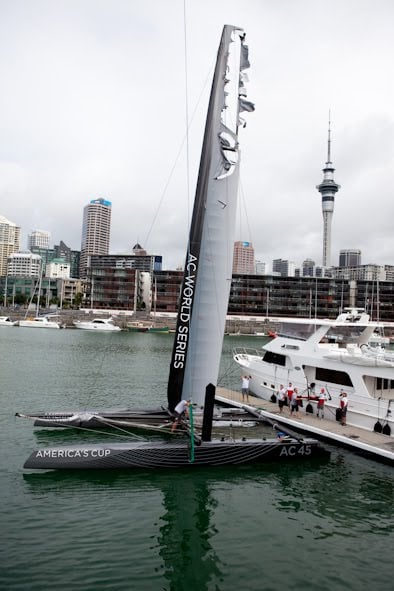
Back in dock after the capsize
It capsized fully, ending upside down. Three support vessels were needed to pick up the crew and right the boat which was sailed back to its base in Auckland. There was damage to the wing sail, but no injuries to the crew. However, helmets may be an additional precaution needed for sailing these boats, which are to be used in the AC World Series! This will be a circuit of eight regattas for which venue bids are being made at present, with fleet and match racing, to raise the profile of high-performance sailing on worldwide television. Racing is to start in July, with regattas running until May of next year, leading into preparations for the next full AC series in the bigger AC72 catamarans in 2013 in San Francisco.
As the past week showed, there is always something interesting in the sea.
This article is reprinted by permission of the EVENING ECHO newspaper, Cork, where Tom MacSweeney writes maritime columns twice weekly. Evening Echo website: www.eecho.ie
Conference Reveals State of Marine Leisure Industry
With boat sales falling by as much as 80%, marina business down 20%, retail sales in chandlery down up to 38%, insurance down 12.5% the marine industry in Ireland and Wales had to take some action to ensure the marine trade and leisure industry survives.
An unusual industry conference took place in Dun Laoghaire today and yesterday with the objective of understanding where the industry is right now and how it needs to act to ensure that it survives the downturn in our economies.
Over 125 marine businesses from both sides of the Irish Sea will be attending in what will be the largest marine leisure Industry gathering ever brought together.
A joint address was given by the Executive Director of the British Marine Federation, Howard Pridding and David O'Brien the Chairman of the Irish Marine Federation set the scene as to where the industry is on both sides of the Irish Sea.
The conference heard from 3 companies who operate in the sector. One from each region, North Wales, South Wales and Ireland who will share with the conference their experiences in the current economic climate on how they are surviving and thriving in the downturn. Business tactics that need to be deployed were explored with a leading business and innovation specialist from Wales together with joint talks by Visit Wales and Failte Ireland on the development of marine leisure tourism.
Leading economist Jim Power delivered a talk on the economic situation and when we might begin to see some consumer confidence return to our markets.
The Pembroke Coastal Forum told how they have managed their coastline and environment and how they have facilitated marine leisure tourism through proper marine spatial planning.
The conference is being organised by irish-sea.org and Ireland/Wales Interreg IV A Programme funded by the European Region Development Fund.
Irish-sea.org has three partners, North Wales Watersports, South West Wales Marine Federation and the Irish Marine Federation.
Marine Leisure Conference Aims to Combat Downturn
Over 120 marine trade and leisure companies from Ireland and Wales are coming together in Dun Laoghaire this week to examine ways to combat the current economic downturn on both sides of the Irish Sea.
Speakers at the conference at the Royal Marine Hotel are drawn from Industry representative organisations, tourism bodies, marine leisure companies, business development specialists, economists and irish-sea.org will provide insights and share knowledge on how to survive the downturn and emerge leaner and stronger when the recovery arrives.
The conference will also provide an industry wide networking opportunity for companies from Ireland and Wales to share experiences and develop business links across the Irish Sea.
Irish-sea.org is an Ireland/Wales Interreg IVA Programme to develop the Irish Sea into a marine leisure centre of excellence.
The programme provides help and support to the sector on both sides of the Irish Sea through marketing, business and vocational training and assisting in the acquisition of research data.
Fine Gael Pledges to 'Steer the Marine' in Election Manifesto
Fine Gael has pledged to reinstate the Department of the Marine in its election manifesto published today. Under the heading 'steering the marine' Fine Gael also says it will replace the Boards of all State Port companies and Harbour Commissions within one year of entering government. The full chapter dealing with Marine is below:
1.11 Supporting the Seafood Sector and Marine
Expanding the Industry: Fine Gael believes Ireland, as an island nation with a strong and valued fishing tradition has huge potential to succeed as a serious competitor in the international seafood sector. The seafood industry currently generates annual revenues of €718 million and provides direct employment for 11,000 people. With an estimated 40 million tonnes of seafood to be required annually by 2030, there is significant scope for further expansion.
Common Fisheries Policy:
We will negotiate the best possible deal for Irish fishermen in the context of the ongoing review of the Common Fisheries Policy. Our priorities are:
• A progressive reduction of discards, fishery by fishery and in all maritime regions in the EU.
• Protection of the Hague Preferences.
• A uniform and transparent regulation regime.
• A clear, independently audited database of infringements across the EU.
• The development of a sustainable aquaculture plan.
• A strong focus on seafood marketing, labelling and country of origin to ensure imports meet the same
standards on safety, hygiene, traceability, recall, information and audit.
Sea Fisheries Bill:
We will publish legislation to replace the criminal sanctions system for minor fisheries offences with an administrative sanction system to bring Ireland into line with other European jurisdictions.
Funding for Fisheries:
Fianna Fáil and Green Party in-fighting has limited Ireland's ability to draw down EU funds for seafood development. We will resolve difficulties blocking the drawdown of available funds. Aquaculture Licensing: An additional 42 million tonnes of farmed seafood will be required to keep pace with demand each year by 2030, just 20 years away. We must increase our raw material supply and expand our aquaculture sector. We will remove administrative obstacles and clear the backlog of aquaculture licences currently preventing the creation of thousands of jobs in the aquaculture sector.
Value Added Products:
Currently, 85% of all Irish seafood is commodity traded. There is a significant opportunity to generate more value from this raw material base. Fine Gael will task Bord Iascaigh Mhara with assisting Irish companies in adding value to their products through innovation.
Single Food Label:
We will create and market a single label for all Irish produce and will drive a targeted marketing campaign to grow the Irish brand in new markets.
1.12 Steering the Marine
Marine Department:
Marine and fisheries policy is currently spread across three Departments. Fine Gael will merge these responsibilities under one Department for better co-ordination in policy delivery.
National Marine and Coastal Plan:
We will develop an integrated marine and coastal planning process to reach the full potential of our coastline in fishing, aquaculture, ocean energy and tourism.
Ports Development:
We will support the development of our ports and marine sector as important drivers of economic growth. We will also replace the Boards of all State Port companies and Harbour Commissions within one year of entering government.
The manifesto is HERE
Labour Manifesto Leads the Way on Irish Maritime Affairs
Fine Gael has told Afloat.ie details of its marine policy will be published in its manifesto tomorrow. If that's the case things are looking up for anyone interested in seeing Ireland develop the valuable waters that surround it.
After searching for references to 'sea', 'marine' or 'maritime' only the Labour party has so far made the only significant written commitment to the marine sector in its programme for government. Its manifesto acknowledges that Coastal Communities, Fisheries and the Marine face major challenges in the years ahead, but it is also an area of major economic potential.
Fianna Fail merely says on page 21 of its manifesto that it will ensure that 'an inter-departmental strategy is in place to improve the leisure potential of our harbours and increase marine tourism'.
The Green Party 'Renewing Ireland' document says it will promote the creation of marinas and youth and child friendly water sports to encourage activity and awareness of our maritime country. It also says Ireland will participates in the North Seas Offshore Grid Plan.
There is no reference to the marine in the Sinn Fein 'There is a Better Way' manifesto.
Four party manifestos are available to download below.
Labour's priority will be to develop Ireland as a European hub for seafood processing, which will create sustainable, value-added jobs in coastal communities.
Labour will also develop an Irish seafood strategy to grow the market profile and demand for Irish seafood products. We will support the development of sustainable aquaculture and fish farms by streamlining the licensing process and reducing, as much as possible, the associated bureaucracy. To further assist the development of the sector, responsibility for maritime policy will, as far as is practicable, be concentrated in one department.
Labour will establish a Sea Fisheries Sustainability Impact Assessment based on consultation with all major stakeholders. This report will be brought before the Dáil on an annual basis before EU fisheries negotiations commence, and will ensure that there is a regular evaluation of Irish fish stocks and the effectiveness of current policy and quotas.
Labour is open to the experience and expertise of those whose livelihoods depend on maritime activity. The Department of Agriculture, Fisheries and Food will engage in an ongoing structured consultation with industry representatives, the marine scientific community and other stakeholders to enable them to contribute to national maritime policy.
Finally, safety at sea and decent working conditions must underpin the development of the fisheries sector. Labour in government will ensure that the Irish Coast Guard has access to an Emergency Towing Vessel.
Dun Laoghaire People before Profit candidate Richard Boyd Barrett who has campaigned under a 'Save our Seafront' banner in the last council elections, is holding a meeting tomorrow night in Dun Laoghaire, the country's largest boating centre to protest against the possible 'privatisation' of the town's harbour.
We're tracking the progress of maritime affairs in the general election and posting details on afloat.ie. Whether you're a candidate or a vote please get in touch with your #ge11 marine news. Contact us via facebook, twitter or our website.
Heritage Council's Online Marine Publications
The following topics below are just some of the categories featured, they include the Bere Island Conservation Plan, Ireland's Sharks & Rays, Conserving Ireland's Maritime Heritage and an Audit of Maritime Collections.
The maritime heritage section of the Heritage Council covers the cultural, physical and ecological dimensions. In addition it embraces the legacies of past generations, their traditions and natural features of both coastal and offshore environments.
For those interested in freshwater topics, the Heritage Council also recognises the importance of our inland waterways and canal network. The Heritage Council has undertaken a Waterway Corridor Studies on the Shannon, as well as on parts of the Grand and Royal Canals. For further information and downloadable in PDF format logn to www.heritagecouncil.ie/inland_waterways/
New World Class Coast Guard National Marine Operations Centre Opens
This morning Minister for Transport Noel Dempsey TD opened the new Irish Coast Guard National Marine Operations Centre in the Irish Coast Guard headquarters, Leeson Lane, Dublin 2.
The Irish Coast Guard National Maritime Operations Centre houses Ireland’s Maritime Rescue Coordination Centre tasked with looking after our day-to-day emergency search and rescue response needs. It also plays an important coordinating role in dealing with pollution incidents in our waters, salvage and ship casualty response, requests from ships in difficulty and control and surveillance of passing shipping and maritime infrastructure off our coast.
Speaking today Minister Dempsey said; "The opening of this centre is a very significant milestone in the development of our national maritime infrastructure. Today we are launching a new world class digital technology platform for the Irish Coast Guard. For the first time all Coast Guard sites in Ireland will be connected to a national IT system that will help better coordinate search and rescuer missions. We now have a single 24/7 international contact point on ship and port security, coast guard to coast guard requests, marine assistance services, satellite alerts and crisis response in the maritime domain. It is a vital hub that co-ordinates our response to save lives and to protect our waters."
Welcoming the formal opening today, Director of the Irish Coast Guard Chris Reynolds said: "The opening today of our new centre will considerably improve the Coast Guards ability to deliver more effective co-ordination of the national marine search and rescue (SAR) service. The systems under development here will also assist in gathering information and support risk assessments for decision making in respect of vessels seeking places of refuge and providing a vessel traffic monitoring and information service for our coastal areas. It has the technical capacity to independently run any type of incident anywhere off our coast. "
Minister Dempsey concluded: "The vision and determination shown in the past decade by the Irish Coast Guard in advancing our Search and Rescue services is an important reflection of the hard work and commitment of all parties to this project despite the current difficult financial times. In partnership with the International Maritime Organisation, the European Maritime Safety Agency, Bonn Agreement and the EU Civil Protection Mechanism, this centre reflects Ireland's commitment to the single point of contact concept for our national Search and Rescue, ship casualty and marine pollution response needs."
No Passage Through Achill Sound
Mayo County Council has advised it will not be possible for boats to pass through Achill Sound until further notice. The announcement came in a Marine Notice issued on December 10th. This is due to on-going works connected with the bridge at the location.
Further details are available from Mayo County Council at telephone +353 (0)98 41169. A new Marine Notice will issue once passage through Achill Sound becomes possible again.
An Irish Maritime Foundation
I wonder whether there might be interest in forming an Irish Maritime Foundation?
I raise the question having discussed the possibility with those who run the UK Maritime Foundation and whose views about the sea about the sea impressed me when I met them in London. The Foundation traces its history back to 1981 when shipowners, senior retired naval officers and people involved in the financial industry reacted to changes in British Government policy that were regarded as failing to protect the importance of the UK maritime industry. It is a registered charity with the purpose of promoting and raising interest in the maritime sector amongst the public, the media and Parliament. To do so it is involved in assisting development of maritime education, training and research.
The British are a magnanimous people in my view. It was an honour to accept the Desmond Wettern Award from the Foundation. Desmond Wettern was a distinguished UK maritime journalist for over 30 years and the awards were established in his name. This year the Society for Nautical Research joined the awards project.
In responding I used one of my favourite descriptions - "the Family of the Sea," which I have used on radio. It drew a lot of interest from those present. I believe there is a "family of the sea" which spans oceans and seas, linking those who appreciate the sea as essential to human survival.
"Everyone who has an interest in the sea would recognise that there are and will continue to be, increasing pressures on its use and on the exploitation of its finite resources, but also a number of opportunities," according to Rear Admiral Christopher Perry, Chairman of the UK Marine Management Organisation. Those views and others I discussed with some of those amongst the 200 attending the function, who came from various parts of the world. Professor Richard Harding of the Society for Nautical Research which is marking its centenary, expressed this opinion: "There is a disturbing sense of sea-blindness in the British Government, amongst the general public at large and in the media."
There is certainly sea-blindness in our Government and in much of the media, though I am hopeful that there is growing awareness of the importance of the marine sector amongst the general public. If Ireland had an organisation like the Maritime Foundation, I would be very pleased.
• This article is reprinted by permission of the EVENING ECHO newspaper, Cork, where Tom MacSweeney writes maritime columns twice weekly. Evening Echo website: www.eecho.ie



























